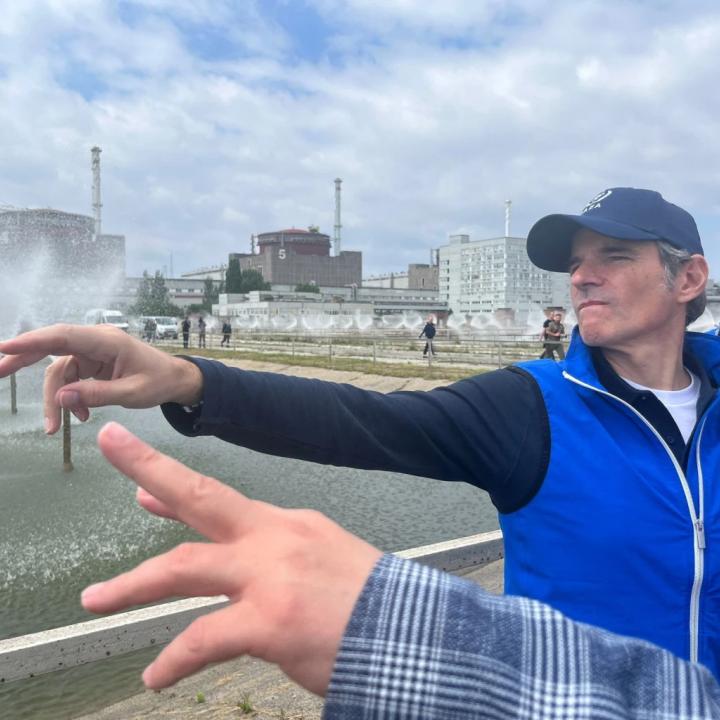

Given the latest uptick in hostilities between Iran and Israel and their reported threats against nuclear facilities, the visit will likely emphasize diplomacy.
On May 6-7, the head of the International Atomic Energy Agency (IAEA), Rafael Grossi, will attend the first International Conference on Nuclear Science and Technology, which Iran is hosting in the city of Isfahan. He is expected to hold talks with various government officials, including Mohammad Eslami, head of the Atomic Energy Organization of Iran. The visit comes shortly after Iran’s April 13 drone and missile attack on Israel (which reportedly included the Dimona nuclear reactor as one of its targets) and Israel’s April 19 military response (which included the destruction of radar systems at a missile site that reportedly protects the Natanz uranium enrichment plant, about seventy miles north of Isfahan).
Although Grossi’s specific agenda and talking points are unknown, he will likely take a diplomatic tack in line with the IAEA’s overarching mission, which is to encourage the peaceful use of nuclear technology and police the system of safeguards that Iran and other member states accept to ensure that such technology is not used for military purposes. During his previous visit in March 2023, he met with Eslami, President Ebrahim Raisi, and Foreign Minister Hossein Amir-Abdollahian, who agreed to a three-part statement regarding collaboration on outstanding safeguards issues. Yet Tehran failed to implement its commitments in that agreement, and its uncooperative tactics worsened after Grossi left, including the ongoing denial of visas to several of the IAEA’s more experienced inspectors.
Grossi has a reputation for being low-key but determined, and an April 23 interview he gave to Deutsche Welle offered a glimpse at the specific pressures he may seek to apply in Isfahan. Regarding the current crisis, he made clear that “attacking nuclear facilities is an absolute no-go.” He also condemned the “very worrisome” trend in which Iran and other actors “brandish the menace of attacking nuclear facilities or even dropping nuclear weapons, as happened...at the beginning of the [Gaza] conflict. So I believe that this normalization of talk about nuclear weapons—dropping nuclear weapons, getting nuclear weapons—is absolutely deplorable.”
Grossi also made cautious but telling statements about the status of Iran’s program. First, he commented on growing concerns about a potential nuclear weapons breakout. While the country is “weeks rather than months” away from enriching enough uranium for a bomb, he said, “that does not mean that Iran has or would have a nuclear weapon in that space of time...A functional nuclear warhead requires many other things independently from the production of the fissile material.” When asked why Tehran would enrich uranium to “military levels” if it does not want a bomb, Grossi called it “a fair question,” noting that the government’s motivations and objectives “are a matter of speculation.” He continued: “In Iran, of course, the public line is that they want this material for medical or other civilian purposes. It’s not very clear why this amount, this speed, and at that level would be required for that.”
Grossi also criticized the restrictions Iran has placed on IAEA inspectors, pointing out that this posture only increases speculation about advances in the program. In addition to telling Iranian officials “time and again” that their elevated enrichment activity “raises eyebrows,” he noted that the IAEA is “not getting the necessary degree of access and visibility...When you put all of that together, then of course you end up with lots of question marks.” This echoed comments he made in February, when he noted that his agency and Iran are “drifting apart” and that the 2015 Joint Comprehensive Plan of Action (JCPOA) has “all but disintegrated.”
Grossi also highlighted “unresolved IAEA findings” in the Deutsche Welle interview, including “traces of enriched uranium in unexpected locations, exacerbating doubts about Iran’s transparency.” He then emphasized his diplomatic role in resolving these matters: “This has been at the center of this dialogue that I have been and I am still trying to conduct with Iran.” In response to a final question about his overarching message in Isfahan, he concluded, “Iran should cooperate more...I will be there to try to put things back on track if [the Iranians] want to be believed...We need to verify. We need to be able to have unfettered access...If they don’t have anything to hide, as they say so vehemently, why [are] they not cooperating with us the way they should?”
Grossi is unlikely to say much publicly during his visit, but the outcome is bound to be discussed at the next IAEA Board of Governors meeting in Vienna on June 3-7. That meeting will also review the latest report from those IAEA inspectors who have been permitted to monitor facilities in Iran.
Simon Henderson is the Baker Fellow and director of the Bernstein Program on Gulf and Energy Policy at The Washington Institute.



